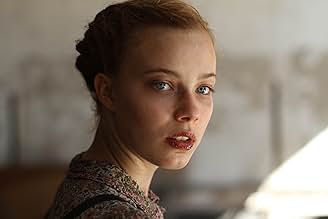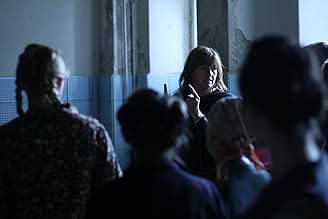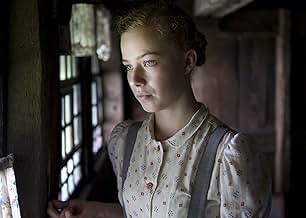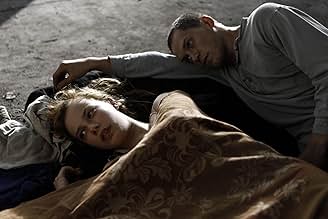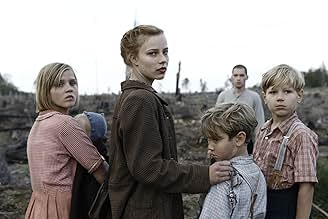VALUTAZIONE IMDb
7,1/10
16.322
LA TUA VALUTAZIONE
Mentre gli Alleati attraversano la Germania, Lore conduce i suoi fratelli e sorelle in un viaggio che li espone alla verità delle credenze dei loro genitori.Mentre gli Alleati attraversano la Germania, Lore conduce i suoi fratelli e sorelle in un viaggio che li espone alla verità delle credenze dei loro genitori.Mentre gli Alleati attraversano la Germania, Lore conduce i suoi fratelli e sorelle in un viaggio che li espone alla verità delle credenze dei loro genitori.
- Regia
- Sceneggiatura
- Star
- Premi
- 34 vittorie e 34 candidature totali
Kai-Peter Malina
- Thomas
- (as Kai Malina)
Nick Holaschke
- Baby Peter
- (as Nick Leander Holaschke)
Claudia Geisler-Bading
- Ox Cart Woman
- (as Claudia Geisler)
Hanne B. Wolharn
- School House Woman 3
- (as Hanne Wolharn)
Recensioni in evidenza
Set in Germany at the end of the Second World War, this film takes up where others like Downfall leave off and asks questions about how the erstwhile beneficiaries of Nazi rule cope with their new world. The film tracks the journey of five innocents as their life of privilege collapses and they are forced to come to terms with the effects of dreadful events over which they had no control but to which they have given their tacit support.
Four of these children are really too young to bear any culpability. Only the oldest, Lore, is really capable of comprehension and it is through her eyes that the film is focused, as she slowly realises just how much her parents are implicated in the horrors of the Nazi regime, and, as an extension of this, herself and the whole German people. Lore is helped to this realisation by Thomas, a Jew who appears to have been liberated from a concentration camp. But Thomas also has a psychological burden and may not be all he appears.
This is another fine film from Cate Shortland, someone who surely should be making more films more often.
Four of these children are really too young to bear any culpability. Only the oldest, Lore, is really capable of comprehension and it is through her eyes that the film is focused, as she slowly realises just how much her parents are implicated in the horrors of the Nazi regime, and, as an extension of this, herself and the whole German people. Lore is helped to this realisation by Thomas, a Jew who appears to have been liberated from a concentration camp. But Thomas also has a psychological burden and may not be all he appears.
This is another fine film from Cate Shortland, someone who surely should be making more films more often.
Lore is an intense drama involving a period of post-WW II German society that is rarely if ever examined and to do it, as this film does, from the viewpoint of German children caught up in these tragic days is worth a visit just out of curiosity. However, this film does not just take a dispassionate look from the viewpoint of historian's or news print, rather because of the wonderful direction of Cate Shortland, this movie moves completely away from ordinary story telling into the far less examined area of psychological change.
Superficially this story is about a family of young children who are forced because of Germany's WW II defeat to make their way from the Black Forrest to their grandmother's home near Hamburg in northern Germany. The story concerns the time before that long journey, the incidents of that journey and finally their arrival at their grandmother's home. Sounds simple and straight forward but the devil, as they say is in the details, or rather the story.
As the story unfolds while the children attempt to reach the grandmother's home, the viewer explores through the eldest, who leads this group, many of the consequences of her past history as a child growing in this family with all the mental baggage implied by this maturation. The drama is carried by this eldest child, Saskia Rosendahl, to whom many of the film's incidents occur.
Moviegoers might be struck by the close-ups used by the director; most of the movie's shots are taken at that range and viewers may not like the method. It contributes to an extremely distinct film, along with the story as well as Rosendahl's superb acting, which must affect the viewer and this after all is why we attend movies to begin.
Superficially this story is about a family of young children who are forced because of Germany's WW II defeat to make their way from the Black Forrest to their grandmother's home near Hamburg in northern Germany. The story concerns the time before that long journey, the incidents of that journey and finally their arrival at their grandmother's home. Sounds simple and straight forward but the devil, as they say is in the details, or rather the story.
As the story unfolds while the children attempt to reach the grandmother's home, the viewer explores through the eldest, who leads this group, many of the consequences of her past history as a child growing in this family with all the mental baggage implied by this maturation. The drama is carried by this eldest child, Saskia Rosendahl, to whom many of the film's incidents occur.
Moviegoers might be struck by the close-ups used by the director; most of the movie's shots are taken at that range and viewers may not like the method. It contributes to an extremely distinct film, along with the story as well as Rosendahl's superb acting, which must affect the viewer and this after all is why we attend movies to begin.
You'd think that, 68 years after the end of the second World War, every perspective would have been covered by the numerous films that have been made about it. But 'Lore' proves that it's still possible to make a movie about an unknown aspect of the war.
In this case, it's the situation in Germany just after the victory of the allied forces. It's a very interesting perspective, because things get turned around. The Nazis are no longer powerful rulers, but hapless losers, afraid to get caught by the Americans. And the Jews, although still despised by most Germans, are the ones who get things done with the allied troops.
The movie shows a country in an almost apocalyptic state, with dead people and destructed buildings everywhere. Citizens can't trust each other and are willing to do anything for some food or transportation. The powers are constantly shifting; an ally can suddenly turn into an enemy.
It's in this utterly destructed and disheartened country that a family without parents is finding its way, led by Lore, a girl of approximately 16 or 17 years old. Her parents, high-ranking Nazis's, have left her to hide from the Americans, and it's up to her to lead her younger sister and three little brothers (of which one is still a baby) to her grandmother in the north of the country. They have to beg for food and shelter, sometimes paying with the jewels her mother left behind.
Australian director Cate Shortland is very good in capturing the mood of desperation and defeat. She uses faded colours, almost like a Polaroid picture, and shows lots of close-ups. Not only of faces, but also of hands, feet, clothes and shoes. It accentuates the oppressive atmosphere in post-war Germany, and the terrible fate of the children. The story gets a twist when the children meet a young man, who for some reason is willing to help them. The relationship between Lore and the young man is ambiguous, for several reasons.
'Lore' is not easy to watch. There are several disturbing and gruesome scenes in the film. But it's a gripping tale of the human urge to survive in almost inhuman circumstances. And most of all, it reminds us of the utter horrors of war. This war, and any war.
In this case, it's the situation in Germany just after the victory of the allied forces. It's a very interesting perspective, because things get turned around. The Nazis are no longer powerful rulers, but hapless losers, afraid to get caught by the Americans. And the Jews, although still despised by most Germans, are the ones who get things done with the allied troops.
The movie shows a country in an almost apocalyptic state, with dead people and destructed buildings everywhere. Citizens can't trust each other and are willing to do anything for some food or transportation. The powers are constantly shifting; an ally can suddenly turn into an enemy.
It's in this utterly destructed and disheartened country that a family without parents is finding its way, led by Lore, a girl of approximately 16 or 17 years old. Her parents, high-ranking Nazis's, have left her to hide from the Americans, and it's up to her to lead her younger sister and three little brothers (of which one is still a baby) to her grandmother in the north of the country. They have to beg for food and shelter, sometimes paying with the jewels her mother left behind.
Australian director Cate Shortland is very good in capturing the mood of desperation and defeat. She uses faded colours, almost like a Polaroid picture, and shows lots of close-ups. Not only of faces, but also of hands, feet, clothes and shoes. It accentuates the oppressive atmosphere in post-war Germany, and the terrible fate of the children. The story gets a twist when the children meet a young man, who for some reason is willing to help them. The relationship between Lore and the young man is ambiguous, for several reasons.
'Lore' is not easy to watch. There are several disturbing and gruesome scenes in the film. But it's a gripping tale of the human urge to survive in almost inhuman circumstances. And most of all, it reminds us of the utter horrors of war. This war, and any war.
An intense coming of age film set during an immense period of modern European history. Finding original stories related to the European theatre of World War Two is difficult, however this film brings an engaging and refreshing lens to the period.
The film focuses on the events at the end of World War II including the death of Adolf Hitler, the tracking down of the perpetrators of the Holocaust, the aftermath of camp survivors, and the territorial carve up of Germany. A time of lawlessness, starvation and depredation.
Within this historical period the film focuses on 5 children brought up as Hitler's Youth, who are on a journey to their Aunt's. The journey brings both physical and psychological challenges along the way for the children. Lore as the eldest child takes on the responsibility of guide, provider and parent. The historical events create the incredible physical tension in the film of a fallen 'utopia' with all of its personal dangers, violence, and hardship.
Along the way they encounter Thomas, a recently released from a concentration camp. The ensuing relationship between Lore and Thomas, which is part survival, part attraction, part revulsion and part adolescent, creates the psychological tension that is at the centre of the film.
The film has echoes of the Films Downfall of the Third Reich and Zentropa in its subject material. All three films by necessity are deeply intense psychological films. The end of the world as most in Germany new it and the incredible psychological changes that the ushering of an entirely new political, social and cultural regime brings. In my world it is almost impossible to imagine, but the children that lived through this are still alive, still with us, the living memories of that period of incredible turmoil. Fertile ground for story telling and film telling about our world and our society.
The film focuses on the events at the end of World War II including the death of Adolf Hitler, the tracking down of the perpetrators of the Holocaust, the aftermath of camp survivors, and the territorial carve up of Germany. A time of lawlessness, starvation and depredation.
Within this historical period the film focuses on 5 children brought up as Hitler's Youth, who are on a journey to their Aunt's. The journey brings both physical and psychological challenges along the way for the children. Lore as the eldest child takes on the responsibility of guide, provider and parent. The historical events create the incredible physical tension in the film of a fallen 'utopia' with all of its personal dangers, violence, and hardship.
Along the way they encounter Thomas, a recently released from a concentration camp. The ensuing relationship between Lore and Thomas, which is part survival, part attraction, part revulsion and part adolescent, creates the psychological tension that is at the centre of the film.
The film has echoes of the Films Downfall of the Third Reich and Zentropa in its subject material. All three films by necessity are deeply intense psychological films. The end of the world as most in Germany new it and the incredible psychological changes that the ushering of an entirely new political, social and cultural regime brings. In my world it is almost impossible to imagine, but the children that lived through this are still alive, still with us, the living memories of that period of incredible turmoil. Fertile ground for story telling and film telling about our world and our society.
Lore (2012)
A gorgeous, depressing, rare film about a family of Germans who need to survive the chaos and poverty of the end of World War II. This is a really terrific movie even though it has a single, basic, ongoing, sad arc--moving from place to place in search of food and safety as the Allies, mostly unseen, take over administration of the country in 1945. What it manages to say is not just that war is bad, or that people have the ability to survive anything if they must, but that beliefs and politics are stubborn and irrational.
It's this last part that comes through it all as the shining purpose. It's one thing for this band of children to beg for food or walk though forests weary and assaulted by marauders. But to have them run into others who, like themselves, don't know where to turn or what is going on, and still have a devotion bordering on worship for the fuhrer is mind blowing. But believable.
The filming--scenes, light, color, moving camera, and the sheer range of all of these from scene to scene--is stunning, absolutely terrific. As you might grow weary of all the weariness, you never grow weary of the movie because it's so rich in other ways. And it's never dull, either, as characters come and go and their motivations turn on a dime. How it ends, both literally and emotionally, will stay a surprise, and yet when it happens it makes such perfect sad undramatic sense.
There are all kinds of war movies, and this is an important insight into one of the least explored aspects to it all--the terrible aftermath. It's an Australian production, mainly, shot in Germany in German. And it's a really special, thoughtful, beautiful film.
A gorgeous, depressing, rare film about a family of Germans who need to survive the chaos and poverty of the end of World War II. This is a really terrific movie even though it has a single, basic, ongoing, sad arc--moving from place to place in search of food and safety as the Allies, mostly unseen, take over administration of the country in 1945. What it manages to say is not just that war is bad, or that people have the ability to survive anything if they must, but that beliefs and politics are stubborn and irrational.
It's this last part that comes through it all as the shining purpose. It's one thing for this band of children to beg for food or walk though forests weary and assaulted by marauders. But to have them run into others who, like themselves, don't know where to turn or what is going on, and still have a devotion bordering on worship for the fuhrer is mind blowing. But believable.
The filming--scenes, light, color, moving camera, and the sheer range of all of these from scene to scene--is stunning, absolutely terrific. As you might grow weary of all the weariness, you never grow weary of the movie because it's so rich in other ways. And it's never dull, either, as characters come and go and their motivations turn on a dime. How it ends, both literally and emotionally, will stay a surprise, and yet when it happens it makes such perfect sad undramatic sense.
There are all kinds of war movies, and this is an important insight into one of the least explored aspects to it all--the terrible aftermath. It's an Australian production, mainly, shot in Germany in German. And it's a really special, thoughtful, beautiful film.
Lo sapevi?
- QuizThe family photographs in the wallet that Lore looks at are pictures of director Cate Shortland's husband's family.
- BlooperThe derelict tank the children pass in the forest is a post-WW2 manufactured Russian T-54/55 or T-62 tank. The balk cross painted on the turret is indicative of an early war paint scheme. Later in the war the 'lines' were thicker.
- ConnessioniFeatured in Film '72: Episodio datato 13 febbraio 2013 (2013)
- Colonne sonoreJugend will marschieren
(Alte Aufnahme)
Folksong
Arranged by Lisa Carlyna Zumpano (ASCAP)
Published by Audiosparx (ASCAP)
I più visti
Accedi per valutare e creare un elenco di titoli salvati per ottenere consigli personalizzati
- How long is Lore?Powered by Alexa
Dettagli
Botteghino
- Budget
- 4.300.000 € (previsto)
- Lordo Stati Uniti e Canada
- 970.325 USD
- Fine settimana di apertura Stati Uniti e Canada
- 31.498 USD
- 10 feb 2013
- Lordo in tutto il mondo
- 2.362.019 USD
- Tempo di esecuzione1 ora 49 minuti
- Colore
- Mix di suoni
- Proporzioni
- 1.85 : 1
Contribuisci a questa pagina
Suggerisci una modifica o aggiungi i contenuti mancanti




